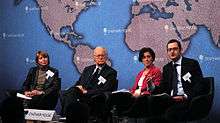Alena V. Ledeneva
| Alena V. Ledeneva | |
|---|---|
 Professor Alena Ledeneva, Laurence Cockroft, Michela Wrong and Paul Kett at Chatham House | |
| Born |
1964 Novosibirsk, Russia |
| Residence | England |
| Fields | Sociology |
| Institutions | UCL School of Slavonic and East European Studies |
| Known for | Study of blat, "sistema", corruption and informal practices in Russia |
|
Website https://www.ucl.ac.uk/ssees/people/alena-ledeneva | |
Alena V. Ledeneva (Russian: Алёна Валерьевна Леденёва; 1964) is Professor of Politics and Society at the School of Slavonic and East European Studies (SSEES), University College London (UCL).[1] She is known for her studies of blat, corruption and informal practices in Russia.[2]
Career
Ledeneva studied Economics at the Novosibirsk State University (1986) and Social and Political Theory at the University of Cambridge (Newnham College, M.Phil.1992; Ph.D.1996). She was Postdoctoral Research Fellow at New Hall College, Cambridge (1996–1999); Senior Fellow at the Davis Center, Harvard University (2005); Simon Professor at the University of Manchester (2006), Visiting Professor at Sciences Po, Paris (2010) and Visiting Professor at the Institute of Advanced Studies, Paris (2013–2014). She is a member of Valdai International Discussion Club. Currently, Ledeneva leads the UCL pillar in the large-scale research project funded by the European Commission's Seventh Framework Program - Anticorruption Policies Revisited: Global Trends and European Responses to the Challenge of Corruption (ANTICORRP).[3]
Research
Ledeneva's 'discovery' of informal practices started with a research of blat – the use of personal networks for getting things done in Russia (Ledeneva 1998). It has helped solve a double puzzle in the history of authoritarian regimes: how people survived in an economy of shortage, and how the regime survived under similar constraint. But it also opened an avenue to explore the nature of political and economic regimes from a new perspective — the perspective of informal practices. Informal practices have become an important indicator in assessing models of governance.
In How Russia Really Works (2006) she has identified the informal practices that have replaced blat in the functioning of the political and economic institutions of the 1990s. This book has been translated into Chinese and Korean.
Arguing that such practices constitute important indicators in assessing models of government, the third volume in the trilogy, Can Russia Modernise: Putin's System, Power Networks and Informal Governance (2013), focuses on the role of clientele networks in informal governance, an emerging supra-national concern, and on the demands that network-based governance systems make on political leaderships.
These monographs (Cambridge 1998; Cornell 2006; Cambridge 2013) constitute a trilogy on Russia that explores workings of informal networks in the Soviet times (grassroots networks), post-Soviet transition of the 1990s (professional networks) and in contemporary Russia (power networks).
The interdisciplinary study of informality has been relevant for studying social capital, consumption, labour markets, entrepreneurship, trust, mobility and migration, shortages, barter, survival strategies, alternative currencies, the shadow economy, redistribution and remittance economies, and democracy (demonstrable in citation index). All these developments illustrate efforts to re-integrate social dimensions into studies of politics and economy and have policy implications.
Selected publications
- Russia’s Economy of Favours (Cambridge University Press, 1998)
- How Russia Really Works (Cornell University Press, 2006)
- Can Russia Modernise? Sistema, Power Networks and Informal Governance (Cambridge University Press, 2013)
References
- ↑ "alena-ledeneva". ucl.ac.uk. Retrieved 2014-05-11.
- ↑ "BBC World Service - The Forum, Corruption: where does it begin and end?". bbc.co.uk. Retrieved 2014-05-11.
- ↑ "University College London, UK (UCL) « Anticorrp". anticorrp.eu. Retrieved 2014-05-11.